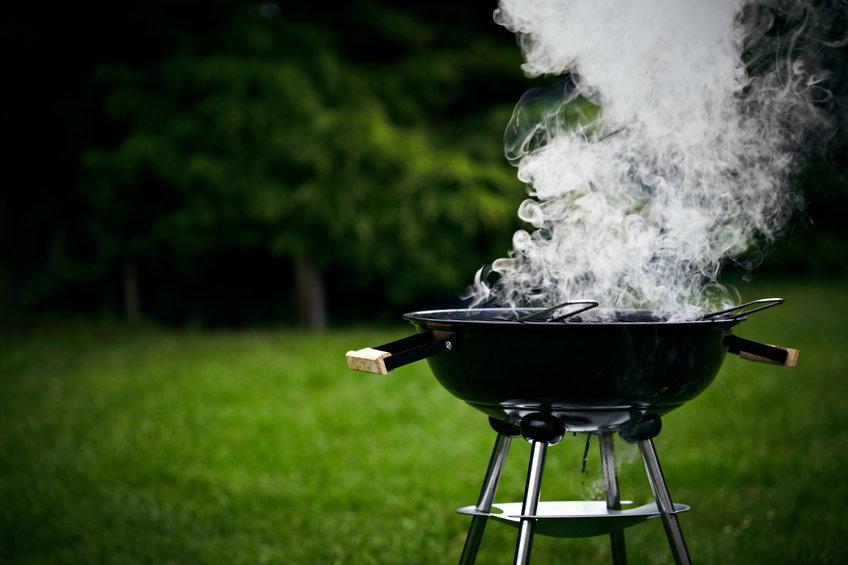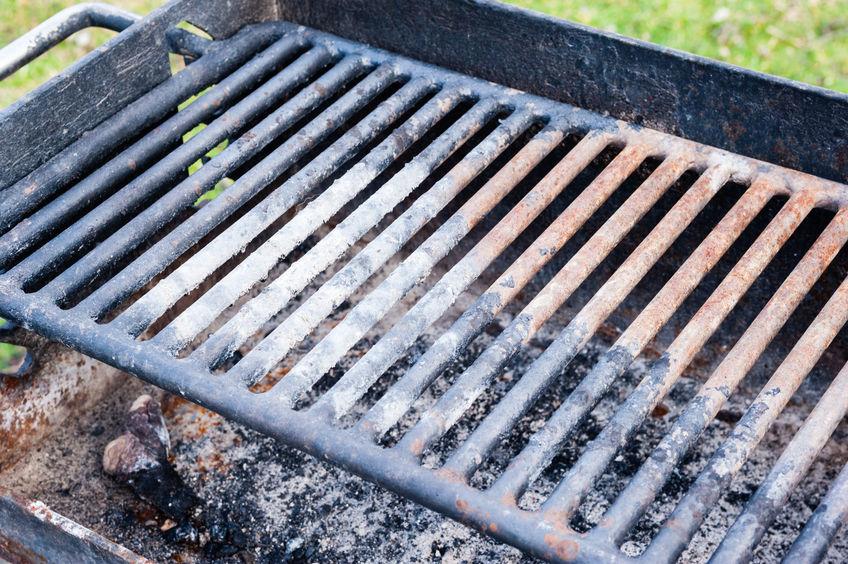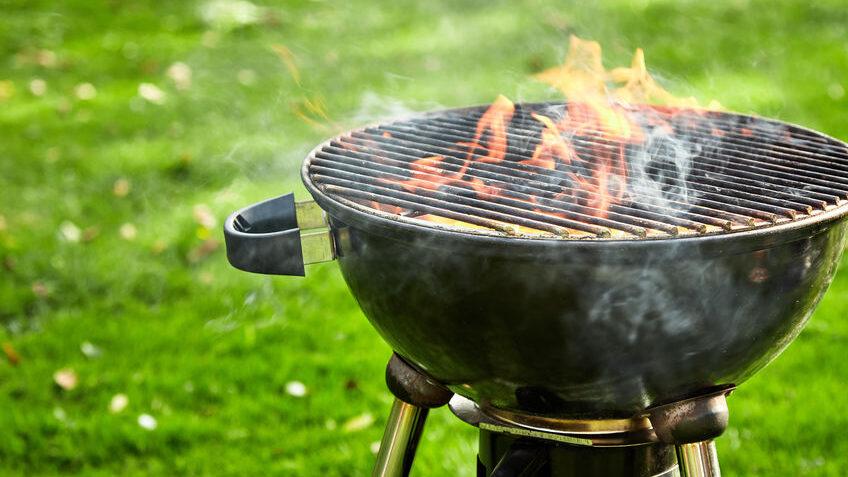This content has been archived. It may no longer be relevant

You’ve just invested in a new charcoal grill and you’re excited for the season ahead.
With its unique smoky flavor and convenience as a solid fuel, you’re surely looking forward to the grilling season.
To make sure you get the most out of your charcoal grill and enjoy years of trouble-free and safe cooking, it’s essential to go through the seasoning process.
Seasoning is a crucial step that protects your grill and prepares it for optimal performance.
Why is seasoning important for a new charcoal grill?
Learn why you need to season a new charcoal grill and follow our simple steps to get started at home.
Why is it Important to Season a Charcoal Grill?
Charcoal grills are designed to provide a simple, effective, and flavorful way to prepare your favorite meals outdoors.
However, when you take your grill out of the box, the grill can be contaminated by chemicals and debris from the manufacturing process.
It doesn’t matter whether you’ve invested in an affordable charcoal grill under $100, or a more premium smoker/grill combo; seasoning is an essential step.
The benefits of seasoning go beyond removing impurities:
- It removes chemical residues, manufacturing oils, paint, dust, and shavings from your grill.
- Your grill will be fully sterilized after the first seasoning.
- Seasoning provides non-stick properties, making it easier to cook your favorite ingredients.
- Seasoning uses oil, which can prevent rust on porous surfaces like painted sheet metal and cast iron.
You can protect your investment and the health of your family with a simple charcoal grill seasoning process.
Steps to Season Your Charcoal Grill

Before you begin seasoning, unpack your grill and familiarize yourself with all of the parts.
Read the user manual and take note of any health and safety tips.
- Rinsing and air drying the cast iron grill grates is the first step in the cleaning process. You won’t need to use detergent for this step. Simply run the grates under cold water (it’s best if you do this outside) and lay them out to dry somewhere where it’s warm and dry.
- Once the grates are completely dry, you can begin seasoning. Take a basting brush or a paintbrush that has never been used. Coat the grates with cooking oil that has a high smoke point. Vegetable oil and canola oil are popular options. If you don’t have a brush, use paper towels or a clean kitchen towel. The oil should be absorbed completely into the grates. Don’t stop until all the metal is coated, and wipe away any excess. [Porcelain enamel cast iron grates do not need to be coated in oil. Simply wash them and continue to the next step.]
- Next, you can move on to the inside of the grill. You’ll need to season all interior panels and the inside of the hood. Use the same cooking oil and apply a layer to all of the surfaces. After the surfaces are covered, put in enough charcoal to fire the grill up for around 30 to 45 minutes. Place the cooking grates over the firebox once the grill is started. Close the hood, and let the seasoning take care of itself.
- As the grill heats up, it will produce a lot of smoke. This smoke is created by surface chemicals from the manufacturing process. The cooking grates and the interior grill will begin to darken. This is normal.
- Let the charcoal die down, and the seasoning process is complete. Your grill is ready for cooking your first juicy steaks, burgers, or whatever your favorite ingredients are.
These essential steps should be followed at any time that you purchase a new grill.
You can also continue to season a charcoal grill throughout its lifetime to prevent rust.
How Often Should You Repeat the Seasoning Process?
The frequency of seasoning your grill depends on how often you use it and the condition of the grates.
As a general guideline, it’s recommended to season your grill grates at least once or twice a year, or whenever you notice that the seasoning has worn off or the grates are becoming sticky or rusted.
Here are some factors that can affect how often you need to repeat the seasoning process for your grill.
- Frequency of use. If you use your grill frequently, especially for high-heat cooking or cooking foods that are prone to sticking, you may need to season your grates more often.
- Type of food cooked. Certain foods, such as acidic marinades, sugary sauces, or foods with high fat content, can cause the seasoning on the grates to deteriorate more quickly. If you regularly cook such foods, you may need to season your grill more frequently.
- Environmental conditions. If your grill is exposed to harsh weather conditions, such as rain, snow, or high humidity, it may be more prone to rusting. In such cases, you may need to season your grill more often to protect it from rust.
- Maintenance routin. Regular cleaning and proper maintenance of your grill can help prolong the seasoning. If you clean your grates thoroughly after each use, keep them dry, and apply a thin coat of oil, the seasoning may last longer, and you may not need to season your grill as frequently.
It’s important to keep an eye on the condition of your grill grates and re-season them as needed to maintain their performance and protect them from rust.
If you notice food sticking to the grates or rust forming, it’s a good indication that it’s time to repeat the seasoning process.
Can You Season an Old Grill?

Yes, you can season an old grill to improve its performance and extend its lifespan.
Seasoning a grill involves coating the grates and other surfaces with oil to create a protective layer that prevents food from sticking and helps prevent rusting.
Seasoning your old grill regularly can help prevent rusting, improve the flavor of your food, and make it easier to clean. It’s a simple and effective way to revive and maintain an old grill for optimal performance.
Seasoning a Charcoal Grill Will Save You Money

Seasoning a charcoal grill can help protect it from rust, prevent food from sticking, and improve its overall performance, which can potentially save you money in the long run by extending the lifespan of your grill and reducing the need for frequent replacements or repairs.
Here’s how seasoning a charcoal grill can help you save money.
- Rust prevention. Seasoning creates a protective layer of oil on the grates and other surfaces of the grill, which helps prevent rust from forming. Rust can degrade the metal of your grill, leading to corrosion and potential damage to the grates, burners, and other parts. By seasoning your grill, you can help protect it from rust, which can extend its lifespan and save you money by avoiding the need for costly repairs or replacement parts.
- Improved performance. Seasoning helps create a non-stick surface on the grates, making it easier to cook food without it sticking and potentially burning. This can prevent food from getting ruined or wasted, reducing the need to replace food that has been burned or stuck to the grates. It also makes grilling more enjoyable and can result in better-tasting food, which can save you money by reducing the need to eat out or order takeout.
- Reduced cleaning efforts. Seasoning can make it easier to clean your charcoal grill as the non-stick surface created by the oil can prevent food debris from sticking to the grates and other surfaces. This can save you time and effort in cleaning, as well as reduce the need for harsh cleaning chemicals or tools that can potentially damage the grill’s surfaces. By keeping your grill clean and well-maintained through seasoning, you can potentially avoid the need for costly deep cleanings or grill restoration efforts.
- Extended lifespan. Seasoning your charcoal grill regularly can help protect it from rust, corrosion, and other damage, which can extend its overall lifespan. This means that you may not need to replace your grill as frequently, saving you money on purchasing a new grill sooner than necessary.
In conclusion, seasoning your charcoal grill can provide several benefits, including rust prevention, improved performance, reduced cleaning efforts, and an extended lifespan, which can potentially save you money in the long run by avoiding costly repairs, replacements, wasted food, and unnecessary purchases.
